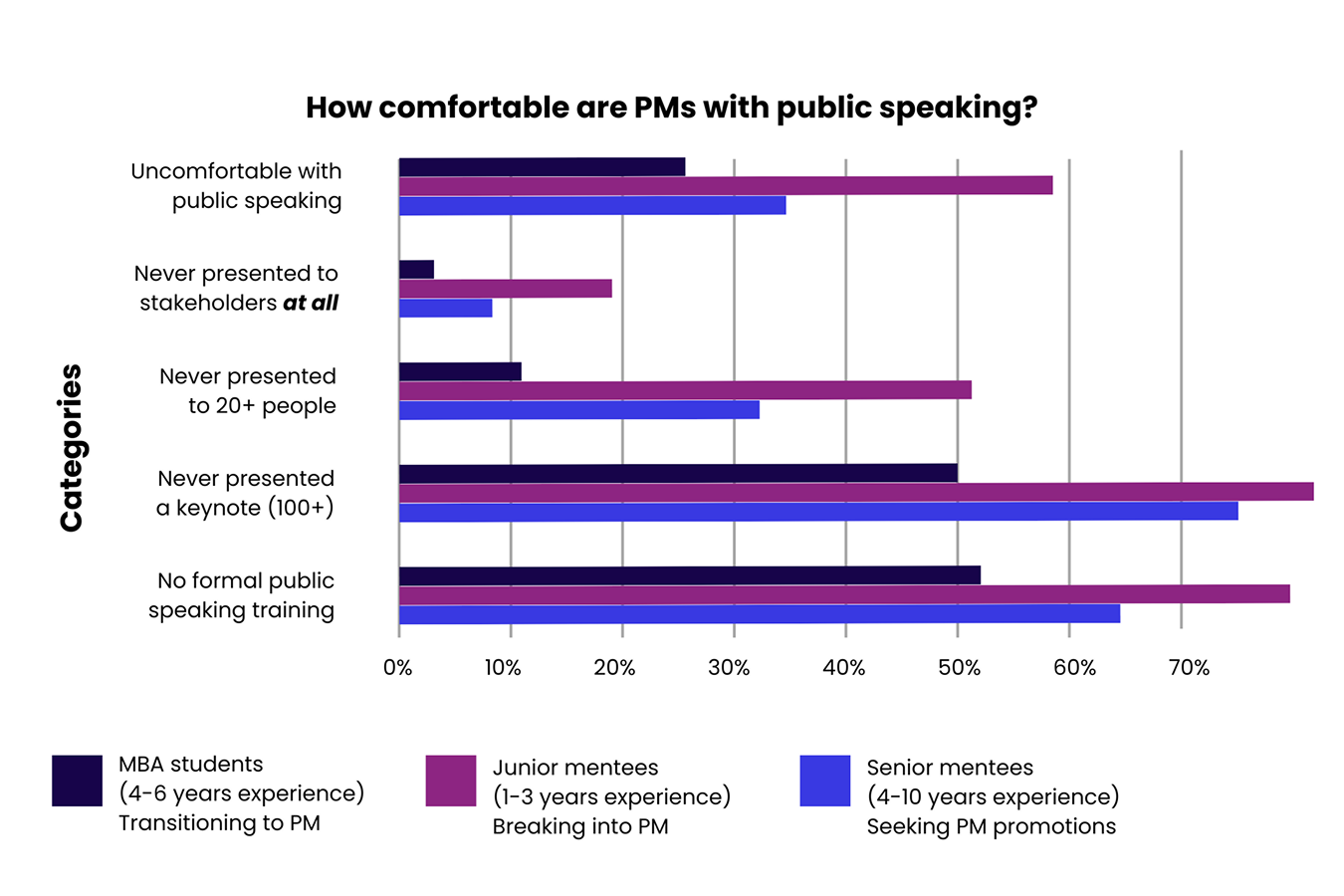Are you being paid what you're worth as a product manager? Do you even know what a typical product manager's salary is? Is there even such a thing? We asked the community to share their thoughts on salaries, negotiating, and more. Here we share the results along with insights from a range of product people.
In brief
- In the product community, there's wide variation in attitude to salary negotiation and expectation
- While history suggests bigger companies typically pay bigger salaries, because the product skill set is still relatively undefined, people shouldn’t expect to see consistency in salaries
- It’s useful to take the temperature and gauge the market value of your skillset at regular intervals
- Many product people feel that there is no clear process around salary reviews at their company
- If you decide to negotiate, keep in mind that preparation is key, and ensure that any conversation you have is done professionally and respectfully
Confused about salaries?
Outside the product community – and perhaps even inside it occasionally – there’s still confusion about what makes a Product Manager and how a product person can progress their career. A couple of years ago Martin Eriksson wrote a very helpful post on the product management career ladder – Product Management Job Titles and Hierarchy, which lays out much of the skill sets and experience expected in different product management roles in successful organisations, and one that businesses can use as a template for their own product team or organisation.
But what about money? In such a young discipline, and one where candidates are scarce, how can businesses be sure that their compensation levels are competitive? And how can product people be confident that they’re being paid what they’re worth? How can you assess market rates, and how can you negotiate your compensation in a way that leaves both parties satisfied with the outcome?
What our survey revealed
Mind the Product conducted a short salary survey to help shed some clarity on the subject (please note: if you read the overview available to Insider members this first section will recap some of that information).
At the time of writing, we had received responses from 226 product people – 35% women, and 65% men, with differing levels of experience and seniority, from all across the globe.
Overall, we found a wide variation in attitude to salary negotiation and expectation. While some respondents are confident of their worth and in organisations where career paths and salary processes are clear, many are uncertain of market rates for their job, in jobs where there is no clear process for reviewing salaries, or simply aren't sure how to go about negotiating their salary.
For example, only 31% of product people think they’re paid the market rate for their job, 42% think they should be paid more than they currently receive, while 19% say they don’t know what the market rate for their job is, with women less likely to know the market rate for their job than men.
Six out 10 respondents say their company doesn’t have a clear process around salary reviews, while for the vast majority of those that do have a clear process (88%), this almost always means an annual salary review.

We asked respondents if they feel confident about negotiating their salary with their manager – 59% said yes, while 40% said no. In addition, two-thirds say they have tried to negotiate their salary, with 68% of these respondents saying their negotiations were successful.
Product people who successfully negotiated a salary increase cite a number of reasons for this success. The main reasons are taking the opportunity to negotiate when switching roles or departments, documenting their results and showing the misalignment of their salary with the market rates, and providing their employer with clear examples of how they provide value above their grade or expectations.
Below are some of their comments.
I got over a 15% increase based on a clear pitch on the value I bring to the table and the impact my work has on both the business and our users/customers.
I negotiated an increase in salary when switching jobs. I have also been unsuccessful at negotiating.
I submitted a very detailed description of my accomplishments, backed up by feedback. I asked around people from other companies about salaries there and brought that into conversation with HR and my manager.
The unsuccessful ones say the main reasons for their failure were budget or financial restrictions, and company policy. Those who've never tried to negotiate say they don’t feel the need to, they don’t have the option to, or they don’t know how to go about it.
Below are some of their comments.
Management is not receptive to negotiation.
My current company has no understanding of product, so it’s hard to convince them of my worth.
I only negotiated when I received the job offer and afterwards it’s more of a black box where I don’t know how my other colleagues are getting paid and so I don’t have any insight into how my negotiation should look.
There are super strict guidelines in my company and the salary process is a total black box – raises only once a year, your manager tells you about your percentage raise when it‘s too late to do anything about it.
We also asked respondents who'd worked in product roles in different countries if the work culture in those different countries affects the process of salary negotiation.
Their experiences were very different – 57% felt that culture made no difference at all, whereas 37% felt it did, with the remaining respondents unsure. Of those who had experienced noticeably different processes from country to country, the reasons switched between attitudes towards culture, race and gender.
Some of their comments are shown below.
Culture plays a huge role in the empowerment of people. In other countries, employees are not actively encouraged to question their worth, their managers, and feeling confident in one's achievements is frowned upon – especially if you are a woman.
Most people will not mention it due to a culture of not challenging the hierarchy. Instead, they’ll just leave.
In the UK, I found almost no room for negotiation. Coming from NYC, it was almost expected to some degree. In London – it wasn't really done.
The product management job market
With such a variation in attitude and experience we thought it would be useful to speak to Nick Charalambous and Allen Bastow, co-founders of recruitment consultancy Few&Far (formerly Knowit), to get a professional view of the product management job market. Few&Far has offices in the UK and the US and specialises in helping businesses to fill roles across product, engineering, design and data.
While we should be cautious about generalisations, it’s their experience that businesses are becoming more transparent about salaries with the introduction of pay grades and salary bands, though this is less likely in a smaller company.
Salaries are industry dependent and also dependent on the business culture from a headquarters perspective, according to Allen. He says: “I spent the last 18 months building out our American office and I found that typically US businesses pay significantly higher. For example, a senior Product Manager in San Francisco might be looking at around $200k to $240k as a basic salary, whereas in the UK, you might be looking at £60k. And Facebook or Google, all those big American tech firms, still pay above market rate in the UK, although they'll calibrate it slightly closer to the UK market. Any kind of financial services, gambling, or gaming businesses typically pay above market rate as well.” Nick adds: “I’d say the base salary at Facebook would probably be between 20 to 30% higher than any other business in tech. Then on top of that there are RSUs – and these are liquid as well, they’re not like equity or stock options. So total packages are just on a different level.”
Generally, large companies offer bigger salaries – bigger packages and bonuses or pensions or healthcare. Salaries also tend to be tailored towards a location, says Nick. “In the UK, London is the area that pays the most. In Manchester, salaries are probably about 20% lower.”
They caution though, that because the product skill set is still relatively undefined, people shouldn’t necessarily expect to see consistency in salaries – something that was certainly reflected in our survey results. Says Allen: “It depends on what kind of products people have worked on, what stage in a product’s development they joined a business at, and on their track record. Say a Product Manager has been very focused on sales and new product development, and comes up with a new revenue stream which adds to the bottom line. That experience is very valuable if they can replicate it at another business.”
Dave Wascha, chief product and technology officer at Zoopla, agrees that much of the disparity between salary levels in Europe comes from the immaturity of the product discipline, adding that the responsibilities of a Product Manager can be very different in different businesses. “The function of product management is far better established in the US – it’s been around for arguably 15 to 20 years longer than it has been in Europe,” he says. “Even five years ago the definition of Product Manager in Europe could apply to someone we would call a Project Manager, or a Product Marketing Manager. By definition, there are very few people in Europe who have been doing product management for longer than five years.” It means you can see a Junior Project Manager and a more accomplished Product Manager who can do customer research and is well versed in different analytics tools, with the same title, similar job descriptions, and even similar paychecks.
Dave is an American who's worked in the UK for the last decade or so, but he previously worked for Microsoft in Seattle. He adds: “In the last six or seven years I’ve interviewed over 1,000 Product Managers in the UK, and then I’ve hired hundreds, I’m always curious to know what people were paid in previous roles and it's just wildly divergent. There's more homogeneity in what people are paid in the US, because the skills set is better understood. You can peg what someone’s paid based on their CV and experience, whereas in the UK I’ve met people making £36K a year that I would have pegged at a £70K a year job.”
Assessing your worth
So how can you go about assessing the worth of a product management role? Obviously it starts with market research. Job sites like Glassdoor, PayScale and Indeed can be used by both employers and job candidates to find data on salaries.
Glassdoor provides a list of company reviews and salaries, direct from employees. For employers this can be used to understand the sentiments about the company and competitors and can be helpful during negotiations. PayScale and Indeed provide salary reports based on a few factors, including experience and education and can be customised based on location as well. For employers, there are also labour market data from various government or private sources, which can be used to help set salary bands.
Nick Charalambous cautions against an over-reliance on job boards: “Jobs boards and the rest give you some indication of a job’s worth but they’re often not nuanced enough to be terribly valuable. Experience in machine learning for example is very much in demand at the moment, as is new product development.” He thinks you may do better to go to something like LinkedIn, assess the equivalent jobs and look at the salaries quoted, and also speak to either a recruiter or someone who’s been working in the space for a while.
Marie Steinthaler, VP for APAC at TrueLayer in Hong Kong, says that it’s useful to take the temperature and gauge the market value of your skillset at regular intervals. “Maybe you engage with every one in 10 outreaches that you get on LinkedIn, if it sounds interesting. Then some do occasional low commitment interviews just to see what's out there, not because you want to leave, but because it's important to get that data.”
Setting salary bands
Salary bands can be tricky to set in the context of other departments in an organisation. Dave Wascha points out that, certainly in the UK, there can be a need to educate other departments on the value of a Product Manager. Unless the HR team is from a tech background they don’t understand Product or price it properly, he says. In his last few jobs, he's had to either educate and or hire the right people in HR and get them used to how Product and tech are different from other kinds of roles.
Salary ranges need to have a minimum, a maximum and a midpoint to provide room for negotiation. You should bear in mind that job applications for Product Manager positions are likely to include existing employees, perhaps some who are even already on the product team, so you need to be aware of current employee salary levels when setting salary bands.
Allen Bastow comments that this can sometimes be a problem for job seekers. “We find sometimes we get candidates who are looking for well above what you'd classify as market rate. That's because they've made a transition to Product internally, and then they want to look externally to try and further develop their skills or try different products. They may have been on £60K say, as a Business Analyst, or a Software Engineer, they've made a move into product management and maintained the same salary, but they've only got one or two years of Product experience.”
The salary review process
Mind the Product’s survey found that the majority of product people feel that there is no clear process around salary reviews at their company, and Nick Charalambous’ experience is that this is more likely to be the case in smaller companies. “Smaller businesses sometimes won’t move your salary at all, if you move internally, and it's much harder to push your salary up if you stay at one company for a long time,” he says.
But reviews, whether they’re quarterly, annual or whatever, are simply good practice, no matter the size of the business, as they provide an opportunity for everyone to reflect on performance, skills sets, career paths, training needs and the like. They also provide an opportunity for salary reviews. So if there’s no clear company process around salary reviews then it’s up to managers and their direct reports to rectify this.
As Richard Banfield, co-author of Product Leadership: How Top Product Managers Create and Launch Successful Products, and VP of Product at InVision comments: “Every organisation needs a career path mechanism in place and unfortunately many don’t have one. Organisations don't organise themselves around career paths, they organise themselves around customer data and shareholder value. They very often forget or don't spend enough time designing the value that's created inside the company for the people that are there.”

He says that it’s part of any manager's job to ensure that their team is given access to the best possible resources to be successful. “If one of your team members comes to you saying that they deserve to be paid more, and, as a manager and you're not aware of that, then both sides are at fault. The manager should have had these kinds of conversations in weekly one-on-ones and they should understand the value of the people that work for them.” The person who thinks they’re worth more should also be clear on the foundation for this: “Is it a conversation they’ve had with friends, something they read in an article, or the demonstration of the work that they've done? Either way, if you're having that conversation, then both sides are not having enough conversation. You should never really get to that point.”
Negotiating salary
What about negotiation? Whether it’s negotiating your pay level when you enter a company, working out your new worth on a promotion, or trying to rectify historic underpayment there are a number of tactics product people can use to demonstrate their worth. And remember that all such discussions are equally important so they should be treated with the same care and preparation as an interview for a new role.
As Richard Banfield says: “The golden rule is to show your work, to demonstrate not only what you've created, but how you created it. So it's very important that product people show how they worked with others – the primary idea behind Product is to make it possible for people to collaborate and work together to create outcomes. So it's important that during negotiations, you should be able to show the path, the journey which you took to get to the outcome. And if I’m a good manager hiring someone, I won’t care just about the outcomes, I want to understand how they got there. Who they worked with, was it a problem worth solving? What were the techniques they used?”
Prepare to negotiate
Some people are inherently better at negotiating than others, whether that’s down to impostor syndrome, confidence, or an understanding of their worth, but, as Richard says: “Negotiation is a part of life. It’s not something you want to do unprepared, it’s a responsibility of being a human in society.” It's something we should learn how to do, and there are lots of coaching, negotiation frameworks and videos and the like available on the internet to help us learn – with former FBI lead hostage negotiator Chris Voss and author and clinical psychologist Jordan Peterson being a couple of well-regarded practitioners.
It’s important to show tangible outputs. As Allen Bastow says: “I always advise my candidates to include any quantitative data they can and to anchor it to a tangible figure if possible rather than present a percentage. If you’re a business Product Manager working on internal tools then you can look at operational efficiencies, there are still fundamental data points that you can demonstrate.”
A good Product Manager facilitates collaboration, and this is something that should be demonstrated in a discussion about a role. It can help to follow a framework which outlines the problem, shows what you did to solve it and overcome any objections, and demonstrates the results and commercial impact. Allen Bastow counsels: "Start using some sort of framework, use role play and practise. Get ready for those conversations, write them down. What do you think the push backs are going to be? One of the ways to handle push backs is to create strategy trees around your answers. Then you bring a level of predictability to it.”
Shefali Modi, Director of AMP Analytics, has worked in the UK, Europe and the US developing B2B solutions, and building new business units and startups. She adds that it's also very important to understand what's valuable to the company.
"A lot of people will say 'this is what I've done', but the reality is, the company wants to know what you can do for them. So it's understanding how you can create new value for the company. Not everything you're passionate about is what the company needs. But if you can align something that you're passionate about, or interested in, with something that company needs, then you're going to be able to show a higher degree of value add."
You can learn to negotiate too, she says: "You can go into a room and say I deserve this, but if people don’t believe it, no one's going to give you what you want. You have to have the ability to make others see the value you think you can give. And that's a big part of negotiating successfully."

And what about the role of gender? Our survey indicated a difference in the success rate of men and women, with women negotiating more often than men but with less success. Dave Wascha says that he consistently gets women coming into his organisation from much lower salaries than the men he hires. And Sharon Anne Kean, in charge of international expansion at Transferwise, adds that in her experience, men are more likely to negotiate on salary than women: “I’ve lost count of the number of women in teams that I've coached and tried to advise on how they can be better at it. I think it’s usually confidence. Women are more likely to underestimate themselves, or they don't believe in themselves, or they're more insecure about their status. So they're less likely to risk anything by saying, actually, I'm going to ask for more.” In fact, as referenced in a Harvard Business Review article and widely reported elsewhere, a finding from an internal Hewlett Packard report found that men will apply for a job or promotion when they meet only 60% of the qualifications, while women apply only if they meet 100% of them.
Cultural variations
The culture around salaries and negotiation can be different in different parts of the world also, as Mind the Product’s survey indicates. The Few&Far recruiters and others comment that people are much more conscious of their worth in the US. “In the US there’s no employment protection and everyone is on two weeks’ notice,” says Allen Bastow. “It means everyone is always interviewing and the networking culture is very different. Product people also tend to stay in one industry, whereas as in the UK they’re more interested in acquiring transferable skills.”
Richard Banfield – a US-based South African who has worked around the world – comments: “Americans tend to be more forthcoming, more transparent about things that relate to money. They may be coy about their own salaries, but they're not coy about everybody else's salaries. They want to have visibility into what other people get paid. They want to know what leaders are getting paid.”
The Asian markets are interesting too. Though less mature than Western markets, rates of pay for product people are comparable with European levels. Marie Steinthaler says that remuneration is very focused on cash, with options or equity unlikely to be offered. She thinks there is a sense in Asia that, especially for technology, product is a cost centre. “It's not seen as a value driver. The bigger organisations and big banks who make up much of the job pool in Hong Kong see Product as a cost centre. A lot of companies, instead of asking about your expectations, ask, ‘what did you make before?’ They have your salary anchored to what you previously made, as opposed to anchoring to market data points.”
Sharon Anne Kean, who previously worked in Hong Kong as director of product for Seek Asia, says that people are much more open about being motivated by money. “I saw that in Hong Kong and Malaysia and I think it’s true throughout Asia generally. I think it’s because the market is maturing very quickly and that people see it’s a way to grow and get status.” Sharon says people have pretty open conversations with each other about how much they earn. “You probably don’t ask your boss that question but you would ask your peers. It’s evolving quickly and has moved to a point where product roles are pretty highly valued. I think culturally, in Asia, everyone is more likely to negotiate because they are more upfront about financial rewards being important. The way compensation is structured is very much about cash rewards, so people are upfront talking about it.”
That said, there’s always a time to learn and a time to earn. As Dave Wascha comments: “When I mentor people who are five or 10 years into their careers, I really caution them against worrying too much about compensation. I don't think it's the right time to try to optimise compensation so much as optimising your capital. There are times when you should get fixated on it – but not five to 10 years into a career.”
The current landscape
Whatever you believe your worth to be, it seems it will always difficult to predict what skills will be in high demand in such a fast-moving discipline, but the Few&Far recruiters have noticed a marked increase in demand for technical product people over the last six months “maybe because more businesses are moving into the SaaS space”.
As for the current situation, the COVID-19 pandemic has meant that many talented product people have lost their jobs or face an uncertain future. It’s this uncertainty that has led those businesses with large cash reserves to ramp up their hiring programmes.
Says Allen Bastow: “Bigger businesses like Google, Facebook, Amazon, all of them are going on a hiring frenzy at the moment. They can take their pick of the talent and then take their time working out where to put it.” He is concerned that it will lead to a big divide in the quality of talent further down the line. “Smaller businesses, or businesses putting things on hold because they don’t have the cash reserves to do otherwise, they’re going to miss out.”
Conclusion
The relatively undefined skill set in product management, and differences in industry and business culture, mean it can be risky to generalise when it comes to salaries for product roles. However, our survey has indicated that many people are unsure they're receiving appropriate compensation at all. In addition, while organisations should have career path mechanisms in place, many don't and even though managers should be having conversations about development with teams, they're often not.
If you're unsure, or simply curious about your own salary, it is worth researching to see where the salary for your particular role might sit against the market rate. You might even find that you're paid more than most! Then, if you do decide to negotiate, know what response you're willing to accept before you go into that meeting, keep in mind that preparation is key, and ensure that any conversation you have is done professionally and respectfully.
In the meantime, our salary survey continues to run and we’d love to know your view (you can complete it here if you haven't already), and if you've found this content useful, we'll continue to monitor the result with a view to reporting any updates in future. You can also share your thoughts in the comments section below.







